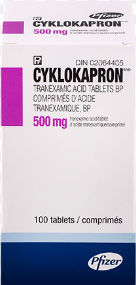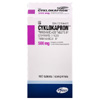  | Cyklokapron (Tranexamic acid) is used for short-term control of bleeding in hemophiliacs, including dental extraction procedures. Active Ingredient: tranexamic acid Availability: In Stock (17 packages) |
| Product name | Per Pill | Savings | Per Pack | Order |
|---|---|---|---|---|
| 30 pills | $3.35 | $100.35 | ADD TO CART | |
| 60 pills | $2.63 | $42.90 | $200.70 $157.80 | ADD TO CART |
| 90 pills | $2.39 | $85.80 | $301.05 $215.25 | ADD TO CART |
| 120 pills | $2.27 | $128.70 | $401.40 $272.70 | ADD TO CART |
| 180 pills | $2.15 | $214.50 | $602.10 $387.60 | ADD TO CART |
| 270 pills | $2.07 | $343.20 | $903.15 $559.95 | ADD TO CART |
INDICATIONS
Cyklokapron is used for reducing or preventing excessive bleeding and reducing the need for blood clotting factor transfusions during or after tooth extractions in patients with hemophilia. It is also used to prevent or reduce bleeding during certain medical procedures (eg, cervical surgery) and to treat certain bleeding problems (eg, nosebleeds, bleeding inside the eye, heavy menstrual periods) in patients whose blood does not clot well. It is also used to treat hereditary angioneurotic edema. It may also be used for other conditions as determined by your doctor.
INSTRUCTIONS
Use Cyklokapron as directed by your doctor. Check the label on the medicine for exact dosing instructions.
Cyklokapron is usually given as an injection at your doctor's office, hospital, or clinic. If you will be using Cyklokapron at home, a health care provider will teach you how to use it. Be sure you understand how to use Cyklokapron. Follow the procedures you are taught when you use a dose. Contact your health care provider if you have any questions.
Do not use Cyklokapron if it contains particles, is cloudy or discolored, or if the vial is cracked or damaged.
Keep this product, as well as syringes and needles, out of the reach of children and pets. Do not reuse needles, syringes, or other materials. Ask your health care provider how to dispose of these materials after use. Follow all local rules for disposal.
Continue to use Cyklokapron for the full course of treatment even if you feel well. Do not miss any doses.
If you miss a dose of Cyklokapron, contact your doctor immediately.
Ask your health care provider any questions you may have about how to use Cyklokapron.DOSAGE
Take exactly as directed. Dosage is generally two to four times daily by mouth. Length of treatment is based on your condition and response.
STORAGE
Store at room temperature between 36 and 86 degrees F (2-30 degrees C) away from sunlight and moisture.
MORE INFO:
Cyklokapron is an antifibrinolytic. It works by preventing blood clots from breaking down too quickly. This helps to reduce excessive bleeding.
SAFETY INFORMATION
Do NOT use Cyklokapron if:
- you are allergic to any ingredient in Cyklokapron
- you have blood clots (eg, in the leg, lung, eye, brain), a history of blood clots, or conditions that may increase your risk of blood clots (eg, certain heart valve problems, certain types of irregular heartbeat, certain blood clotting problems)
- you have bleeding in the brain, blood in the urine, or bleeding related to kidney problems
- you have a disturbance of color vision
- you have irregular menstrual bleeding of unknown cause
- you are using medicine to help your blood clot (eg, factor IX complex concentrates or anti-inhibitor coagulant concentrates)
Contact your doctor or health care provider right away if any of these apply to you.
Some medical conditions may interact with Cyklokapron. Tell your doctor or pharmacist if you have any medical conditions, especially if any of the following apply to you:
- if you are pregnant, planning to become pregnant, or are breast-feeding
- if you are taking any prescription or nonprescription medicine, herbal preparation, or dietary supplement
- if you have allergies to medicines, foods, or other substances
- if you have a history of kidney problems, diabetes, polycystic ovary syndrome, bleeding or blood clotting problems, a certain blood problem called disseminated intravascular coagulation (DIC), eye or vision problems, or bleeding in the brain
- if you are very overweight
- if you have a personal or family history of blood clots or endometrial cancer
- if you also take estrogen or tamoxifen
Some MEDICINES MAY INTERACT with Cyklokapron. Tell your health care provider if you are taking any other medicines, especially any of the following:
Hormonal birth control (eg, birth control pills), medicines to help your blood clot (eg, anti-inhibitor coagulant concentrates, factor IX complex concentrates), or tretinoin (all-trans retinoic acid) because the risk of blood clots may be increased
Desmopressin, hydrochlorothiazide, nitroglycerin, ranitidine, or sulbactam-ampicillin because the risk of heart attack may be increased
Anticoagulants (eg, warfarin) because they may decrease Cyklokapron's effectiveness
This may not be a complete list of all interactions that may occur. Ask your health care provider if Cyklokapron may interact with other medicines that you take. Check with your health care provider before you start, stop, or change the dose of any medicine.PREGNANCY and BREAST-FEEDING: If you become pregnant, contact your doctor. You will need to discuss the benefits and risks of using Cyklokapron while you are pregnant. Cyklokapron is found in breast milk. If you are or will be breast-feeding while you are using Cyklokapron, check with your doctor. Discuss any possible risks to your baby.
SIDE EFFECTS
All medicines may cause side effects, but many people have no, or minor, side effects. Check with your doctor if any of these most COMMON side effects persist or become bothersome:
Diarrhea; nausea; vomiting.
Seek medical attention right away if any of these SEVERE side effects occur:
Severe allergic reactions (rash; hives; itching; difficulty breathing; tightness in the chest; swelling of the mouth, face, lips, or tongue); calf or leg pain, swelling, or tenderness; chest pain; confusion; coughing up blood; decreased urination or difficulty urinating; eye problems; fainting; numbness of an arm or leg; one-sided weakness; pain, swelling, or redness at the injection site; seizures; severe or persistent dizziness or light-headedness; shortness of breath; slurred speech; sudden, severe headache or vomiting; vision changes or problems (eg, disturbance of color vision, sharpness, or field of vision).
This is not a complete list of all side effects that may occur. If you have questions about side effects, contact your health care provider. Call your doctor for medical advice about side effects.